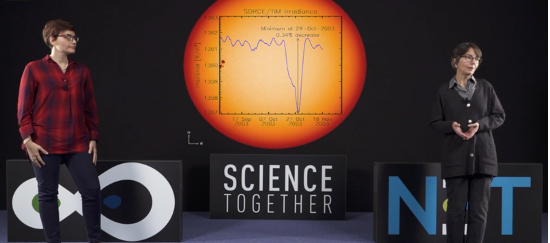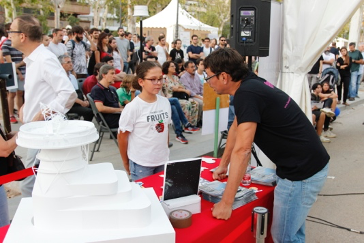Summary
The landscape of public engagement and science communication is undergoing a shift in both culture and attitudes, and is becoming an increasingly pivotal way to involve the public in modern science activities. This has been recognised during previous and ongoing European-funded projects developed around high-resolution solar physics (EST Design Study 2008-2011; SOLARNET 2013-2017; GREST 2015-2018; PRE-EST 2017-2021), and has led to the development of a coherent pan-European communication and outreach strategy, coordinated by the EST Communication Office (EST Comm at the CSIC-IAA) and involves a majority of the SOLARNET partners.
Given the breadth of the EST Communication activities, the SOLARNET project aims to deliver a complementary action that is aimed at building capacity in the community through the training of Science, Technology, Engineering & Mathematics (STEM) researchers.


Motivation
A relevant report in the UK by research funders (“Factors affecting public engagement by researchers – A study on behalf of a consortium of UK public researcher funders”) highlights a positive shift in attitudes of STEM researchers towards public engagement. However, the report’s key findings suggest a factor that potentially limits STEM researchers from undertaking public engagement is that they feel underequipped to engage in such activities.
While the report discussed above is focused on UK-based researchers, similar issues will affect STEM researchers across other EU countries – given that the UK is a leader in supporting STEM researchers in public engagement (see a report from the FP7-funded PERARES project – “Experiences and attitudes of Research Funding Organisations towards public engagement with research with and for civil society and its organisations”).
Moreover, a lack of experience and training in science communication can potentially limit the effectiveness of delivering key messages and the impact of the activities.
Capacity Building in SOLARNET
The focus of the SOLARNET outreach activities is then aimed at building capacity in the community through the training STEM of researchers (from PhD students to senior members) to confidently and effectively deliver science communication and public engagement activities that inspire and involve audiences.
We envision that such activity will promote aspects of Responsible Research and Innovation, producing lasting impact by developing a culture of inclusive and informed public engagement, and further enhancing the communication and engagement activities already undertaken by the community.
Our activities will build upon best practice in outreach from across consortium partners, sharing knowledge through:
· The development and delivery of workshops;
· The development and delivery of training sessions;
· Provision of resources.
Workshops & Training
The planned provision aims to equip researchers with the necessary skills to provide meaningful and impactful public engagement; and enable them to evaluate the effectiveness of their efforts. They will concentrate on helping STEM researchers to reach a wide range of audiences and guiding them to delivering engaging, inspiring and appropriate activities. There will be an emphasis on school interactions that focus on curriculum-driven, career-orientated engagement aimed at attracting young people to science careers; and increasing participation in science from audiences with low science capital (e.g., females, poor socio-economic backgrounds).
Details on the first workshop can be found here.
Details on the second workshop can be found here.
These activities will be led by Northumbria University working directly with experts in Pedagogy and Science Education/Communication (NUSTEM), and liaising and collaborating with the IAC’s EU Project Office and the EST Communication Office to ensure cohesion with existing strategies.
Resources
We also provide a selection of resources that provide an entry starting point for Public Engagement and Science Communication. The provided materials form a complete workshop on the Sun that can be delivered to children (4-11 years), along with a solar-inspired board game, and additional tools for evaluation of the workshop. There are also materials available from the SOLARNET Workshops and Training sessions on Public Engagement.
The resources can be found at this page.
